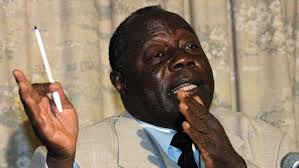South Sudan’s national dialogue co-chair Angelo Beda said the issue of former army chief Paul Malong who is now under house in Juba would not affect the ongoing consultative meetings on the national dialogue process in Northern Bahr al Ghazal.
Malong, who hails from Aweil East, is being confined to his home in Juba for security reasons. He was sacked in May by President Kiir after resignations by senior military officials.
Angelo Beda said in an interview with Radio Tamazuj on Wednesday that the national dialogue subcommittee in Aweil led by Kuol Athian is currently carrying out consultations on the root causes of the ongoing conflict.
“The issue of political detainees would be solved at the appropriate time, but it would not affect the ongoing national dialogue in Aweil, so the dialogue is continuing,” Beda said.
However, the elderly politician promised that his national dialogue committee will raise the issue of former army chief Paul Malong to the national government in order to find amicable solutions.
“The national dialogue committee is listening to all complaints including the detention of Paul Malong. We will raise those issues and some of the problems will be solved now and other things will be solved after the dialogue,” he said.
Last week, intellectuals, members of disabled union and other groups in Aweil protested against the South Sudanese government's detention of former army chief General Paul Malong.
The demonstrators carried banners demanding the release of General Paul Malong upon the arrival of the national dialogue subcommittee in the town of Aweil last week.
Press freedom
Separately, the national dialogue co-chair Angelo Beda said they want the ongoing national dialogue process to be covered by national and international media houses in the country.
Angelo claimed that he didn’t know that independent media houses including Radio Tamazuj had been blocked by the government. “We want the media including Radio Tamazuj to cover the activities of the national dialogue because many South Sudanese are living outside the country,” he said.




